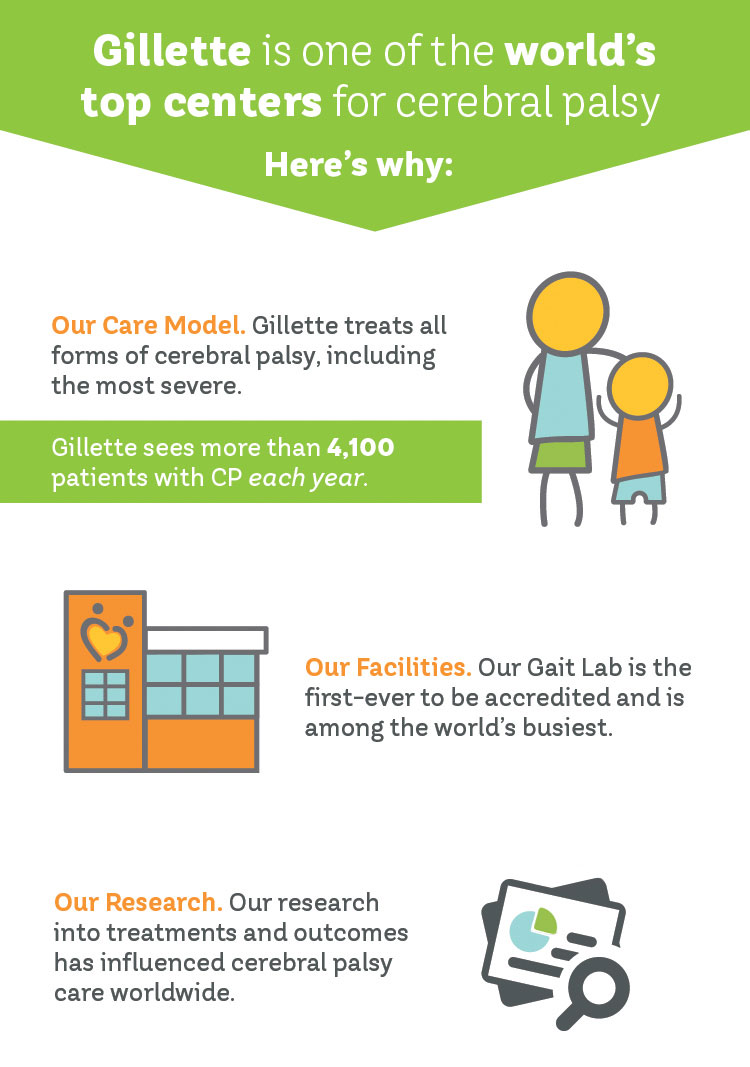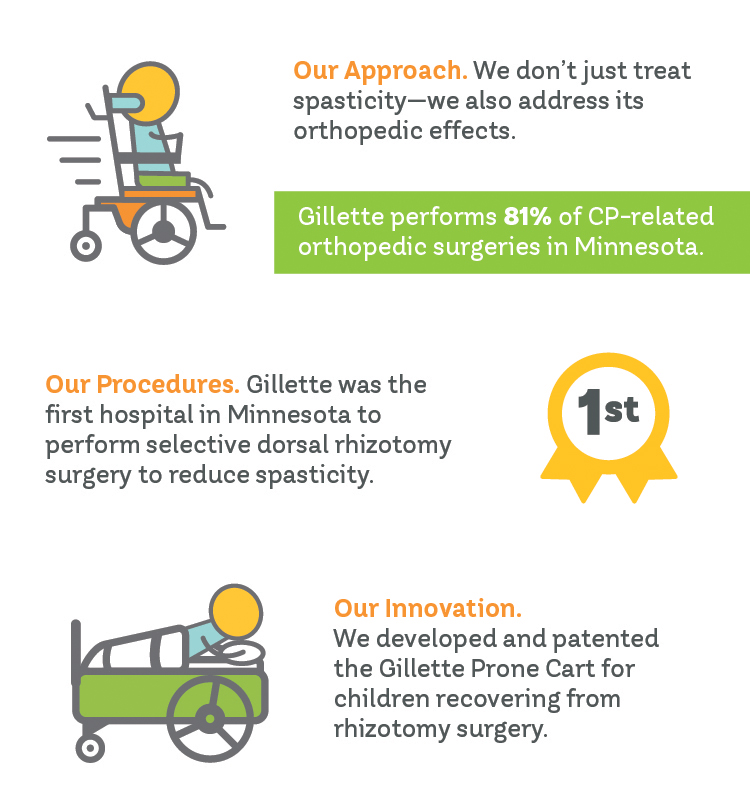EVALUATIONS AND TESTING
At Gillette, a patient who has complex medical condition, such as cerebral palsy, often sees specialists in neurology, neurosurgery, orthopedics, rehabilitation medicine, sleep medicine, rehabilitation therapies and assistive technology. Working in teams, our specialists offer a wide range of collaborative evaluations and expert testing to support care and treatment. Evaluations and tests might include:
- Audiology testing
Early diagnosis and interventions are essential to minimize the effect of hearing loss on communication abilities and overall development. Gillette’s audiology tests are designed for people who might be nonverbal, experience developmental delays, or have other challenges that can affect evaluations and testing. In the Twin Cities, we are the first children’s health care organization to offer auditory brainstem response (ABR) testing that doesn’t require patients to sleep or be sedated. We also have the expertise to sedate patients when necessary for testing. Gillette performs the following evaluations for patients of all ages and ability levels. We also offer speech therapy for patients who experience communication issues resulting from hearing difficulties… Learn More >>
- Complex Movement Disorder Assessment
Complex movement disorders can be difficult to diagnose and treat. That’s why Gillette established a team of complex movement disorder specialists from neurology, pediatric rehabilitation medicine, neurosurgery, orthopedics and rehabilitation therapy. In most cases, specialists can diagnose these disorders using a visual examination of movements. However, some complex movement disorders can be caused by an underlying health condition or injury, so additional testing and evaluation may be done to ensure other medical conditions do not need to be addressed. Some common tests and evaluations for diagnosing complex movement disorders include: … Learn More>>
- Developmental Testing
As experts in diagnosing complex and rare conditions, Gillette’s neurodevelopmental pediatricians can provide initial assessments, second opinions or family consultations when a child has already received a diagnosis… Learn More >>
- Gait and Motion Analysis
Using innovative computer technology at Gillette, motion analysis captures movements, muscle activity and forces that the eye can’t see. Although some people have similar walking patterns, the way their muscles and joints work together can vary widely. Motion analysis helps care teams accurately identify problems specific to each patient. Information from motion analysis—together with imaging scans, the patient’s medical history and the results of other evaluations—helps a patient’s care team recommend the best treatments for abnormal movement… Learn More >>
- Neurodiagnostic Testing
Neurodiagnostic tests are done when a patient’s illness or condition is thought to be based in the central nervous system (brain and spinal cord). There are two types of neurodiagnostic testing: imaging tests or scans, such as an electroencephalogram (EEG), and electrical impulse detection, such as an electromyogram (EMG). Neurodiagnostic testing might be conducted as part of a neurological exam. Gillette offers a variety of neurodiagnostic tests to make or confirm a diagnosis, plan treatments, and monitor a patient’s condition. Tests Gillette offers include… Learn More >>
- Neuropsychological Evaluations
Neuropsychological evaluations show the cognitive effect of the neurological condition of a patient in areas such as attention, memory, learning and problem solving. Gillette’s neuropsychology team evaluates children, teens and adults who are experiencing cognitive difficulties, or mood and behavioral regulation challenges, associated with complex medical conditions and injuries. Some of the conditions most often associated with evaluation needs include… Learn More >>
- Nutrition and Feeding Evaluations
During feeding evaluations at Gillette, a team assesses the child and his or her skills related to feeding. For example, some children have difficulty chewing or swallowing, aversions to certain food textures, and anxiety during mealtimes. We evaluate many factors, including the patient’s anatomy, behavior, diet and level of independence with feeding. Gillette’s core feeding team includes registered dietitians, speech and language pathologists and occupational therapists. We refer patients to other Gillette specialists, when needed, to help maintain proper nutrition and support health… Learn More >>
- Pulmonary Function Testing
Pulmonary function tests are a group of tests that measure how well the lungs take in and release air and how well they move gases such as oxygen from the atmosphere into the body’s circulation. Gillette pulmonologists and respiratory therapists work closely with patients and families to plan treatments that maximize lung function and slow deterioration. We perform on-site pulmonary function testing to help determine a patient’s needs. Sleep studies can also be helpful in pinpointing problems associated with breathing at night. At times, we recommend medications to manage symptoms. Respiratory devices and assistive technology also can help patients who need more extensive respiratory support. Some of the specific tests and treatments we offer or collaborate to provide include… Learn More >>
- Radiology and Imaging
Gillette experts provide imaging tests for children, teens and adults who have physical and cognitive (thinking and learning) disabilities. Gillette offers a wide range of imaging tests to help diagnose problems and evaluate outcomes following treatment. Some of the tests we perform most often include: Computed tomography (CT) scans, Bone density (DXA) scans, magnetic resonance imaging (MRI) test, ultrasonography and sonography (ultrasound) test, fluoroscopy and video fluoroscopy exams, and X-rays… Learn More >>
- Sleep Study (polysomnography)
A sleep study (polysomnography) is one of many tools we use at Gillette in one of the nation’s only sleep medicine programs designed specifically for children, teens and adults who have disabilities and complex conditions. A sleep study (polysomnography) is a painless overnight study to evaluate a patient for sleep disorders. It generally includes monitoring a patient’s blood pressure, electrocardiographic activity, blood oxygen level, brain wave pattern, eye movement, airflow through the nose and mouth, and movement of respiratory muscles and limbs. Concerns might include sleep apnea (pauses in breathing during sleep, hypersomnolence (excessive sleep), insomnia… Learn More >>
- Spasticity Evaluation
A spasticity evaluation at Gillette involves a number of specialists in diverse disciplines working together. Our goal is to get a complete picture of a patient’s muscle spasticity and its related effects. Spasticity evaluations involve experts in, gait and motion analysis, neurosurgery, orthopedic, physical therapy and rehabilitation medicine. Our team collaborates to evaluate a patient’s spasticity from a variety of perspectives and form a comprehensive treatment plan… Learn More >>


